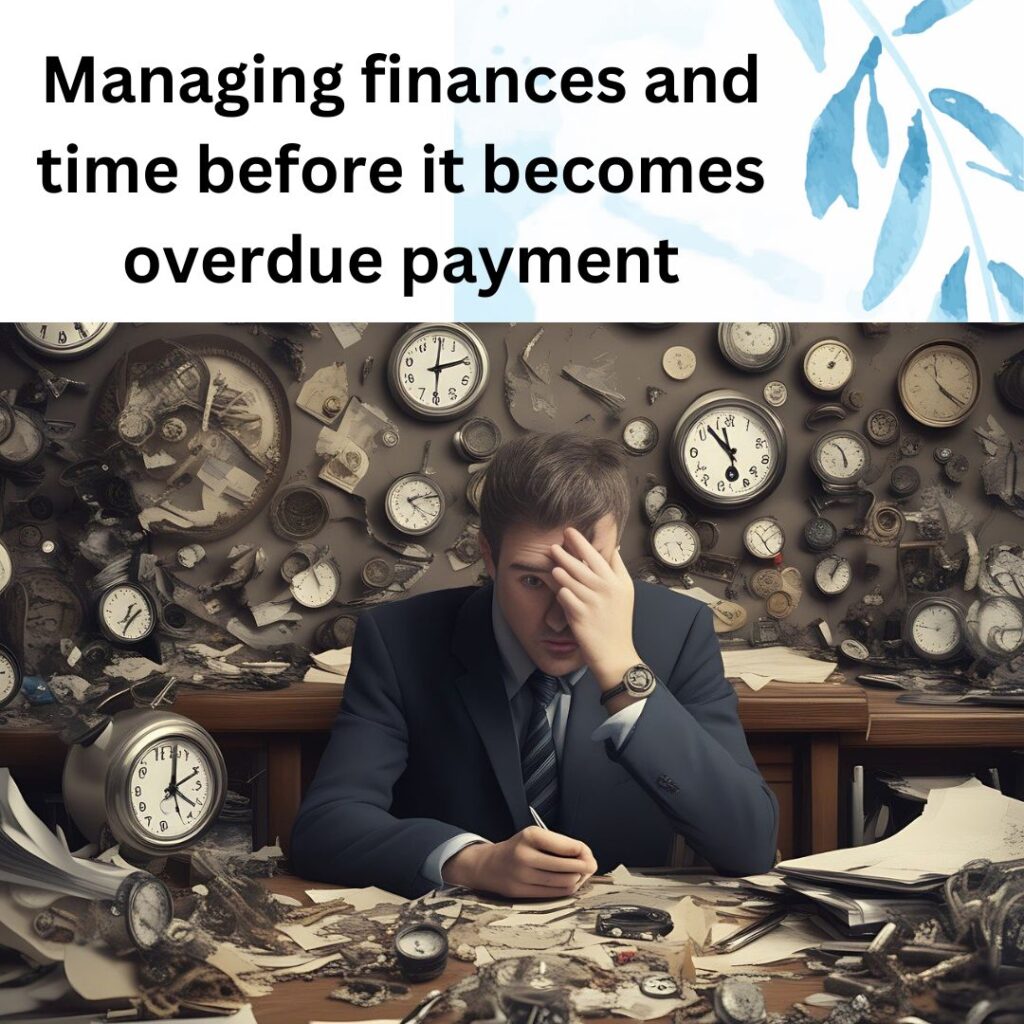Table of Contents
ToggleI. What is overdue payment
An overdue payment refers to a payment that has not been made by the due date. This can include unpaid bills, credit card charges, rent payments, and other financial obligations. Late payment like this can have serious consequences, including late fees, damage to credit scores, and even legal action.
Types of Overdue Payments
There are many different types of overdue payments, including:
Credit card bills: This is one of the most common types of overdue payments. If you miss a credit card payment, you will be charged a late fee and your interest rate may increase.
Utility bills: Missing a utility bill payment can result in late fees and service interruptions. In some cases, you may even be disconnected from your utilities.
Rent payments: If you miss a rent payment, you could be charged late fees, evicted from your apartment, and sued by your landlord.
Other financial obligations: This could include car payments, student loans, and other types of debt.
II. Causes of overdue payment
There are many reasons why people may have overdue payments. Some of the most common causes include:
Financial hardship: This could be due to job loss, illness, or other unexpected expenses.
Overspending: If you are spending more money than you earn, it can be difficult to make all of your payments on time.
Lack of organization: If you are not organized with your finances, it can be easy to miss payment deadlines.
Effective Strategies and Solutions
There are a number of things you can do to deal with overdue payments, including:
Contacting creditors and bill collectors: It is important to communicate with your creditors and bill collectors to let them know that you are having trouble making your payments. They may be willing to work with you to set up a payment plan or reduce your debt.
Setting up payment plans: A payment plan is an agreement to pay off your debt over a period of time. This can make it more manageable to make your payments.
Disputing incorrect charges: If you believe that a charge is incorrect, you can dispute it with your creditor. This may involve providing documentation to support your claim.
III. Consequences of overdue payment
Overdue payments can have a number of negative consequences, including:
Late fees: This is a charge that is added to your bill when you make a late payment. Late fees can add up quickly and make it even more difficult to pay off your debt.
Damage to credit score: Your credit score is a number that represents your creditworthiness. Late payments can damage your credit score, which can make it difficult to borrow money in the future.
Legal action: If you repeatedly miss payments, you could be sued by your creditors. This could result in wage garnishment, liens on your property, and even bankruptcy.
IV. Ways to avoid overdue payment
Set up calendar notification on phone for next bill
In today’s fast-paced world, it’s easy to lose track of important deadlines, including bill payment dates. To prevent overdue payments and their associated consequences, setting up calendar notifications on your phone can be a simple yet effective strategy.
By entering the due dates of your bills into your phone’s calendar, you’ll receive timely reminders to make the necessary payments before they become overdue. This simple step can help you stay organized, avoid late fees, and maintain a good credit score.
Additionally, many bill providers offer online bill pay services and mobile apps that allow you to schedule automatic payments directly from your bank account. This can further automate the payment process and ensure that your bills are paid on time, even when you’re busy or forgetful.
Buy things on a monthly 0% instalment
When making significant purchases, consider utilizing 0% installment plans offered by many retailers and credit card companies. These days there are so many plans out there that can help you reduce your burden of paying full cost upfront. Some of these companies for Buy Now Pay Later (BNPL) are like afterpay, atome pay, hoolah, Paypal etc depending on which country you are at and which one offers it. These plans allow you to spread out the cost of the purchase over a fixed period, typically 6 to 24 months, or 4 payments plan, without incurring any interest charges.
To ensure you make timely payments and avoid late fees, it’s crucial to factor the monthly installment amount into your budget and set up reminders to make the payments on time. By utilizing 0% installment plans responsibly, you can make large purchases without straining your finances or incurring additional debt. Same thing, you can always set up your calendar, giving you notifications on when you should pay.
Automate payment
This will be the easiest way, however it depends on who you are dealing with and if they have this available. Automating your payments is one of the most effective ways to avoid late fees and maintain a good credit score. Many bill providers and financial institutions offer automatic payment options, allowing you to schedule recurring payments directly from your bank account. This can save you time, effort, and the hassle of remembering due dates.
To automate your payments, follow these steps:
Identify your bills: Determine which bills you want to automate, such as utilities, credit cards, rent, or other recurring expenses.
Enroll in automatic payment: Contact your bill providers or financial institutions to inquire about their automatic payment options. They may have online portals or mobile apps where you can set up recurring payments.
Provide payment details: Enter your bank account information and the amount you want to pay for each bill. You can typically set the payment date to coincide with your paydays or choose a specific date each month.
Review and update: Regularly review your automatic payment schedule to ensure it aligns with your current bills and financial situation. Update your payment details or cancel automatic payments for bills that no longer apply.
Monitor your account: Monitor your bank account and bill statements to ensure that automatic payments are being processed correctly and that your bills are being paid on time.
By automating your payments, you can take control of your finances, avoid late payments, and maintain a positive financial standing.
Create a budget and spend below your means
Creating a budget is a fundamental step in managing your finances effectively and avoiding overdue payments. A budget provides a clear picture of your income and expenses, allowing you to allocate your funds wisely and prioritize essential payments.
To create a budget, follow these steps:
Track your income: Record all sources of income, including salary, wages, side hustle earnings, and any other recurring income streams.
Monitor your expenses: Track all your expenses for a month, categorizing them into essential and non-essential categories. This includes housing, utilities, food, transportation, entertainment, and other spending.
Calculate your net income: Subtract your total expenses from your total income to determine your net income. This represents the amount of money you have left to allocate towards savings, debt repayment, and discretionary spending.
Prioritize essential payments: Allocate a portion of your income towards essential payments, such as rent, utilities, debt repayments, and other unavoidable expenses.
Plan for discretionary spending: Once you’ve covered essential expenses, allocate the remaining funds towards discretionary spending, such as entertainment, dining out, and personal expenses.
Review and adjust: Regularly review your budget to ensure it aligns with your current financial situation and spending patterns. Make adjustments as needed to maintain a balance between income and expenses.
Creating and adhering to a budget empowers you to manage your finances responsibly, prioritize essential payments, and avoid the stress and consequences of overdue payments.
Establish emergency fund for unexpected expenses and emergencies
Establishing an emergency fund is a crucial step towards financial resilience and preventing overdue payments. An emergency fund is a dedicated savings account that serves as a safety net for unexpected expenses, such as job loss, medical emergencies, or in these case payment of extra bills incurred.
You need to have one as in the case that you are out of a job and still have bills to pay, these emergency fund will act as a buffer to pay off living expenses and other bills that are still needed to be paid no matter you are still working or out of a job.
V. What to do if you have just received an overdue payment letter
Receiving an overdue payment letter can be a stressful experience, but it’s important to remain calm and take action promptly. Here are the steps you should take:
Review the letter carefully: Understand the details of the overdue payment, including the amount due, the due date, and any potential late fees or penalties. If you are lesser than 1 week and have been paying it regularly on time, you could give them a call and ask if they can waive the penalty as you will have to pay for more and explain that it was an honest mistake and you will make payment straight away.
Determine the reason for the overdue payment: Identify whether the overdue payment is due to a genuine financial hardship, an oversight, or an error on the creditor’s part.
Contact the creditor immediately: Establish communication with the creditor as soon as possible. Express your willingness to resolve the issue and inquire about possible solutions.
Assess your financial situation: Evaluate your current financial standing to determine if you can make a full payment immediately. If not, consider negotiating a payment plan or requesting a temporary deferment.
Gather necessary documentation: Prepare any relevant documents, such as pay stubs, bank statements, or proof of income, to support your financial situation and negotiation efforts.
Negotiate a payment plan: If a full payment is not feasible, propose a payment plan that aligns with your financial capabilities. Be realistic about what you can afford and stick to the agreed-upon terms.
Make payments on time: Once a payment plan is established, make all payments on time and in accordance with the agreed-upon schedule. This demonstrates your commitment to resolving the overdue payment and maintaining a positive relationship with the creditor.
Monitor your credit report: Keep an eye on your credit report to ensure that the overdue payment is reflected accurately and that your credit score is not negatively impacted.
Prevent future occurrences: Implement strategies to avoid future overdue payments, such as creating a budget, setting payment reminders, and maintaining organized financial records.
VI. Conclusion
Overdue payments can be a significant source of stress and financial strain, but with proactive measures and effective strategies, you can effectively manage and resolve them. By understanding the types of overdue payments, their potential consequences, and the underlying causes, you can take control of your finances and prevent similar issues from recurring.
Remember, financial literacy and responsible spending habits are key to maintaining financial stability and avoiding overdue payments. Empower yourself with the knowledge and resources to manage your finances effectively, make informed decisions, and build a solid financial foundation for a secure future.




